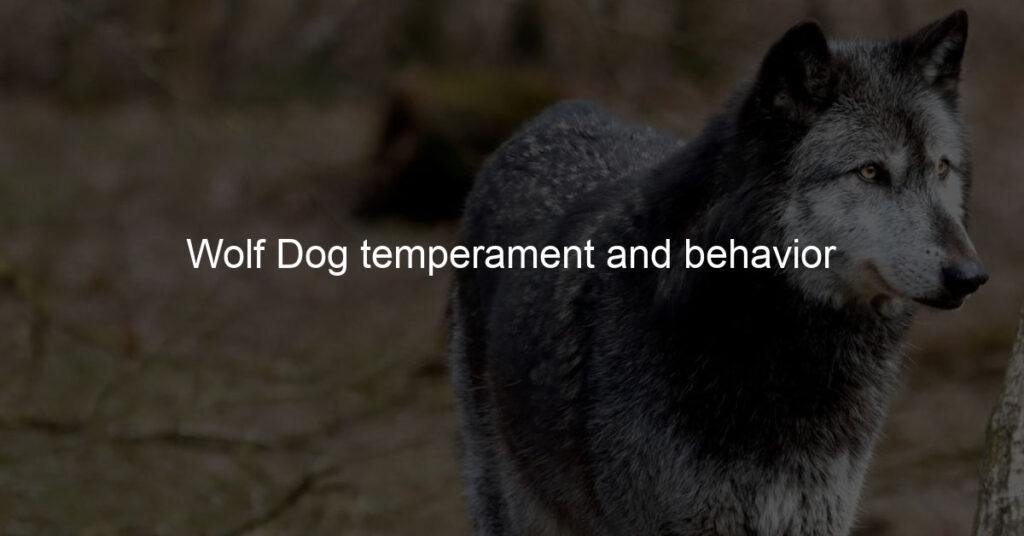Are you thinking of adding a wolf dog to your family? Owning one of these unique and majestic creatures can be an incredibly rewarding experience, but it is important to understand their temperament and behavior to ensure they are given the best care possible. Wolf dogs require a lot more attention than most other breeds, as their inquisitive nature and free-spiritedness will keep you on your toes!
What is the personality of a wolf-dog?
Wolf dogs, also known as wolf hybrids, are a combination of a wolf and a domestic dog. They are largely unpredictable when it comes to their personality traits, as it can be a mix of both the wildness of the wolf and the domesticated nature of a dog.
These animals often appear to understand the human language better than other breeds and tend to respond more reliably to verbal commands due to their high intelligence. They also make excellent watchdogs due to their territorial instincts and strong protective instinct over family members.
Finally, wolfdogs have an abundance of energy that need serious physical and mental stimulation for them to remain calm. All in all, they are true pack animals with an eager spirit that takes patience and understanding from their patient owners.
Are wolf dogs good family dogs?
Owning a wolf dog can be a great experience for those looking for an unusual pet – but it’s not for everyone. Wolf dogs typically require more exercise and training than other breeds and can present unique challenges in terms of temperament.
If well-socialized, they may make loyal, devoted family pets; however, if you do have children in the house it is important to remember that these animals retain their instincts as predators. With careful training and supervision, though, a wolf-dog hybrid can be an amazing companion animal – offering years of faithful love and entertainment.
How is Wolf Dog behavior different from dog behavior?
Wolf Dogs, also known as wolf hybrids, have a unique temperament compared to regular domesticated dogs. These canines exhibit a much higher level of intelligence that requires more extensive training and socialization. They are often quite loyal to their owners and require plenty of positive reinforcement when being trained.
Not only do they require mental stimulation, but they crave lots of physical activity as well due to their naturally high prey drive. While Wolf Dogs may show similar behaviors as other dogs, prospective owners need to take into account the more primitive instincts that make them different from a typical pooch.
Are wolf dogs friendly?
Wolf dogs can be surprisingly friendly, despite their intimidating appearance. Rather than being indiscriminately aggressive the way wolves tend to be, wolf dogs that are raised interactively and receive proper socialization can make a great addition to the family as they become loyal and loving companions.
They’re even typically quite eager to please their owners which can make training them a breeze. That said, wolf dogs are still much wilder and less predictable than domestic dogs so proper training and dedicated care are essential for owners who want to welcome such an animal into their home.
Are wolf dogs aggressive?
Wolf dogs have a reputation for being aggressive, but this isn’t necessarily the case. If a wolf dog is well-socialized early on and has proper training, then it can be just as friendly as any other breed of domestic dog. Wolf dogs need to be taken care of like any other breed, with routine vet check-ups, exercise, and lots of love!
But if they’re not handled properly, they may be more likely to exhibit aggression. So if you plan on getting a wolf dog, make sure you provide them with everything they need – the right diet, plenty of playtimes, and lots of socialization. With the right amount of attention, you can help your wolf dog stay content and friendly!
Are wolf dogs destructive?
Having a wolf dog can be a rewarding experience yet intimidating. Wolf dogs are often misunderstood when it comes to their behavior. While they can possess physical traits that make them look like wolves, they get their behavioral traits from domestic dogs, which tend to require training and socialization just as any other canine would.
This said wolf hybrids aren’t the most popular of dogs due to the potential for destructive or aggressive behavior if not properly socialized and trained. However, with proper care and guidance, wolf dogs can be loyal companions that bring an exotic flair to your life.
Conclusion
All in all, wolf dogs are intelligent and loyal animals. Their social interaction and behavior can depend on their upbringing and training, as they can both become stubborn but also very playful. With the right understanding and care, you can have a wonderful companion animal to share your home with. As with any pet, it is important to do your research before owning a wolf dog. This means knowing your country’s laws regarding owning them as a pet, making sure you have the experience necessary for providing daily care for them, and being prepared for any particular need that may arise along the way. As long as you are patient, gentle, and respectful with them, these wonderful animals make fantastic companions that will offer joy and fulfillment to your life!








